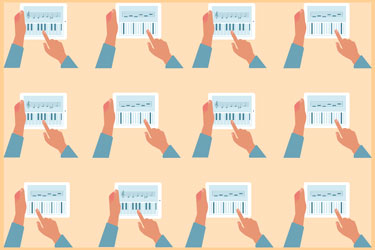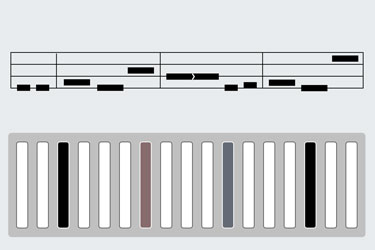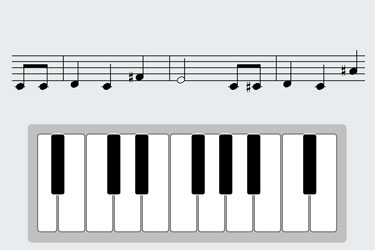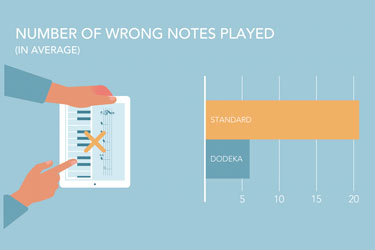Dodeka Music Notation versus Conventional Notation - A Comparative Study
Posted on April 21, 2018

Looks like we weren't that wrong when we said that Dodeka was an easier way to learn to play music. See for yourself!
In March 2018, we went to l’ecal - Lausanne Art and Design School - in Switzerland to conduct a short study on Dodeka alternative music notation. The main idea of this study was to get a better overview on the benefits and advantages Dodeka brings to music students in a quasi scientific environment and in comparison to conventional music method. Here are some of the main results .
The study
We asked 25 students to take part in this 5-minute experiment. We made two groups. One with Dodeka music notation and the other one with conventional music theory. The study was split into two parts. First, participants had to read some explanations - mainly the basics - about the method they were assigned to. After that, they were asked to play a short song of 11 notes using the method they had just learn about. All of it was conducted using iPads and administered through two web apps that were specifically developed for the occasion.
So to sum up, there were two groups, two music methods, and the exact same song to play.


Here are the images of the web apps used during the study. The song was randomly created. It included 11 notes, 3 of which were altered. The live version of the app can still be found here: Dodeka version and standard version (in French only).
In the experiment, we assessed three elements. First, we measured the accuracy to which the participants played the right notes, or in other words, the number of wrong notes each participant played. Second, we recorded the time participants required to complete the full song. Finally, we compiled the participants’ impressions and opinion vis-à-vis the music method proposed through a quick survey at the end of the study.
The results?
For one thing, participants using Dodeka music method were more accurate. The group actually made in average 3.6 less errors when playing the notes compared to their counter parties with conventional notation. Precisely, the group using Dodeka made in average 5.4 mistakes, while the standard group played in average 20.4 wrong notes. Although this doesn’t seem like much, it is important to remember that the song only had 11 notes, which is not much.

3.5 times less errors were registered when participants used Dodeka music notation.
Additionally, the group with Dodeka was also faster. While the average time for the traditional group to complete the song was 2 minutes and 04 seconds, Dodeka participants played it in 1 minute and 06 seconds in average, which is almost two times faster.

Dodeka participants were almost two times faster to play the short song than the conventional group.
Finally when participants were asked to rate the method they had used, about 80% of the participants using Dodeka rated it as “easy”. By comparison, only 40% of the participants in the standard group said the same for the method they used, the other half rating it as “moderately difficult” or merely “difficult”.

Dodeka music notation was rated as "easy" by 80% of the students who used it. Twice as more as the conventional group.
Overall, this study is certainly a small study considering the size of its sample. Yet if anything it still sheds light on some tendencies, which foresee significants benefits for music students on a long-term perspective. To recall, the study we conducted only lasted 5 minutes, which is really not much. Learning a musical instrument takes more time. For this reason we plan to conduct two more studies in the near future. One similar to the one presented in this article with a larger sample (at least 100 participants) and a second one with a much larger time frame, somewhere around 2 to 6 months.
Get involved
We are looking for volunteers (music students, teachers and beginners) to take part in our a long-term study. If interested and are as excited about Dodeka as we are, get in touch. We’d love to to follow you over the course of your learning journey with Dodeka.
** We are currently working on the Dodeka Music Library project, which seeks to translate as many sheet music as possible into the Dodeka notation. Check out our progress and get early access to the first ever Dodeka music library. **